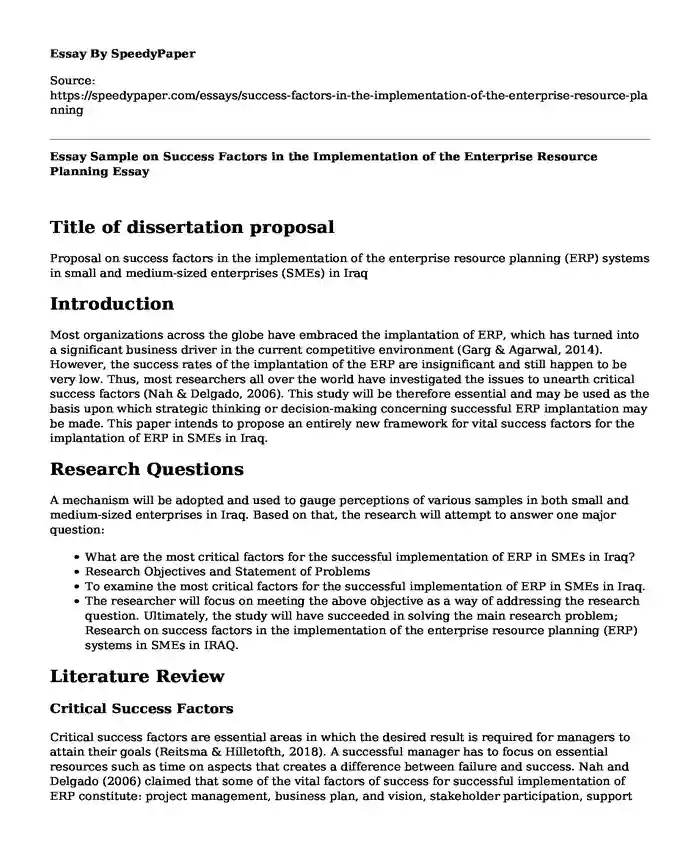
| Type of paper: | Dissertation proposal |
| Categories: | University Learning Knowledge |
| Pages: | 3 |
| Wordcount: | 752 words |
Title of dissertation proposal
Proposal on success factors in the implementation of the enterprise resource planning (ERP) systems in small and medium-sized enterprises (SMEs) in Iraq
Introduction
Most organizations across the globe have embraced the implantation of ERP, which has turned into a significant business driver in the current competitive environment (Garg & Agarwal, 2014). However, the success rates of the implantation of the ERP are insignificant and still happen to be very low. Thus, most researchers all over the world have investigated the issues to unearth critical success factors (Nah & Delgado, 2006). This study will be therefore essential and may be used as the basis upon which strategic thinking or decision-making concerning successful ERP implantation may be made. This paper intends to propose an entirely new framework for vital success factors for the implantation of ERP in SMEs in Iraq.
Research Questions
A mechanism will be adopted and used to gauge perceptions of various samples in both small and medium-sized enterprises in Iraq. Based on that, the research will attempt to answer one major question:
- What are the most critical factors for the successful implementation of ERP in SMEs in Iraq?
- Research Objectives and Statement of Problems
- To examine the most critical factors for the successful implementation of ERP in SMEs in Iraq.
- The researcher will focus on meeting the above objective as a way of addressing the research question. Ultimately, the study will have succeeded in solving the main research problem; Research on success factors in the implementation of the enterprise resource planning (ERP) systems in SMEs in IRAQ.
Literature Review
Critical Success Factors
Critical success factors are essential areas in which the desired result is required for managers to attain their goals (Reitsma & Hilletofth, 2018). A successful manager has to focus on essential resources such as time on aspects that creates a difference between failure and success. Nah and Delgado (2006) claimed that some of the vital factors of success for successful implementation of ERP constitute: project management, business plan, and vision, stakeholder participation, support by top management and dedication, change management, technological infrastructure, training and education, and finally, communication.
Significance of the Study
The accomplishment of the study will lead to substantial input to knowledge. The subsequent analysis, as well as findings on the research problem, will inform management in several ways. For one, managers will be informed of the fundamental success factors which are necessary for successful ERP implementation. This can be considered in terms of the probable application in SMEs. Besides, (Garg & Agarwal, 2014) argued that the knowledge gained will be valuable in understanding the interplay between the management and role o the employees in ensuring that the organizations meet their goals. This will be important in understating the general aspects of ERP implementation in SMEs in Iraq.
Research Methodology
The research will make use of mixed-method of data collection as this is very important in offsetting the limitation of quantitative and qualitative. Abutabenjeh and Jaradat (2018) argued that using a quantitative method will not provide the researcher with an opportunity to study and understand one's attitude on a given subject. This can, however, be easily achieved by a qualitative method (Abutabenjeh & Jaradat, 2018). Mixed-method, therefore, will provide a holistic approach to cover a topic comprehensively. The researcher will embrace the interview as the primary method for quantitative data collection as it will offer an opportunity to customize the question according to the respondent's ability (Abutabenjeh & Jaradat, 2018). The interview will help the researcher to establish the level of accuracy in data collection by observing the respondents' behavior. Despite being considered a disadvantage because of its subjective nature, the method was opted for because of its flexibility. The main method for use in quantitative research will be questionnaires as this will assist in the collection an immense data in the shortest possible period hence time and energy saving. Besides, sampling, focus groups, experiments, and surveys will be used depending on the situations they may best match.
References
Abutabenjeh, S., & Jaradat, R. (2018). Clarification of research design, research methods, and research methodology. Teaching Public Administration, 36(3), 237-258. doi: 10.1177/0144739418775787
Garg, P., & Agarwal, D. (2014). Critical success factors for ERP implementation in a Fortis hospital: an empirical investigation. Journal Of Enterprise Information Management, 27(4), 402-423. doi: 10.1108/jeim-06-2012-0027
Nah, F., & Delgado, S. (2016). Critical Success Factors for Enterprise Resource Planning Implementation and Upgrade. Journal Of Computer Information Systems, 46(5), 99-113. doi: 10.1080/08874417.2006.11645928
Reitsma, E., & Hilletofth, P. (2018). Critical success factors for ERP system implementation: a user perspective. European Business Review, 30(3), 285-310. doi: 10.1108/ebr-04-2017-0075
Cite this page
Essay Sample on Success Factors in the Implementation of the Enterprise Resource Planning. (2023, Mar 27). Retrieved from https://speedypaper.net/essays/success-factors-in-the-implementation-of-the-enterprise-resource-planning
Request Removal
If you are the original author of this essay and no longer wish to have it published on the SpeedyPaper website, please click below to request its removal:
- Public Health Essay Sample on Immigrant Health Issues: Ethical Dilemma
- Free Essay with Q&A Concerning Organization Structure and Management
- Officer in the U.S. Army, Essay Example for Students
- Essay Sample on the Importance of Summer Internship Job
- Essay Sample on Freeholders Meeting
- Free Essay: Reformational View of Vocation
- Hospital Proof-Based Practices. Essay Example
Popular categories




